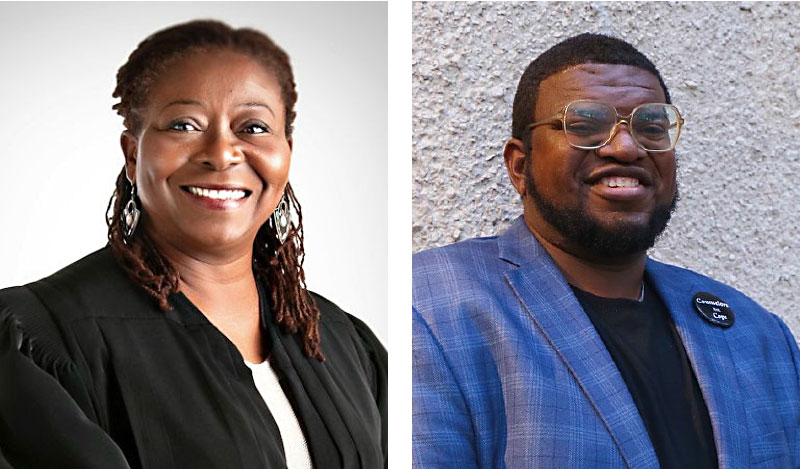Progressive Responses to Evictions, Truancy Define Justice of the Peace Contests
Power to the People in the "People's Court"
By Austin Sanders, Fri., Feb. 18, 2022
Often described as the "people's court," the chambers of our local justices of the peace are the only place many Travis County residents are likely ever to interact with the legal system. That's where claims lawsuits under $10,000 are considered, where some drivers need to deal with their traffic violations, where truant students and their parents are referred, and where landlords go to seek permission to evict their tenants. In the JP races for Precincts 1 and 5, it's those last two duties that have put incumbents Yvonne Williams and Nick Chu in the spotlight, and helped define their primary challenges from Andrew Hairston and Cassie Malone. (The other three JPs are unopposed for reelection both in the primary and in November.)
Williams was first elected in 2010 to serve Pct. 1, a district that stretches from Central East Austin out to Manor and Elgin from the court's chambers at MLK and Springdale Road. She was ready to retire when her current term expired in 2022, concluding a decades-long legal career that included work as a litigator at the Texas Workers' Compensation Commission and service as a Municipal Court judge.
What changed her mind? One reason she's running for a fourth term is to continue programs she's established at JP1, like a juvenile justice diversion program that helps keep truant students in school and out of the justice system, especially as schools navigate the world of hybrid in-person and remote learning that's emerged during COVID. But Williams is also not shy about another reason she's running again: She doesn't think a suitable candidate has stepped up to the plate to replace her. "I don't want to be working past my 70s," Williams told us recently. "This is the last one, no question about that."
That's her assessment of Hairston, a 30-year-old attorney from Louisiana who says his identity as a Black bisexual man practicing civil rights law has helped him "develop a deep zeal for social and racial justice." He's also a member of the Democratic Socialists of America who has spent his young legal career in advocacy, first with a D.C.-based, justice-focused nonprofit, and now as a policy director with Texas Appleseed, where he's focused on education issues, including the school-to-prison pipeline.
But Hairston has no experience practicing law in Texas, let alone as a judge. He became a licensed attorney in Texas on Nov. 23, 2021, following a nine-month "character and fitness" examination initiated by the Texas Board of Law Examiners. While Hairston lived in D.C. from 2016 to 2019, he didn't apply for the D.C. bar, which is not uncommon for advocacy attorneys licensed elsewhere. The BLE alleged that Hairston misrepresented himself when he failed to disclose this fact when he applied to practice law in Texas.
Following the investigation, a three-member panel ruled unanimously, and swiftly, that Hairston was fit to practice law in the state. Hairston described the episode, which ultimately cost him more than $3,000 in legal fees, as "the most anti-Black racism I had ever experienced." He has since filed a formal complaint against the State Bar of Texas staff attorney who initiated the investigation. The ordeal further motivated Hairston to seek the JP1 bench: "It is part of the reality facing working-class Black and brown people across Travis County," he reflected. "Centuries of pernicious stereotypes put upon us that make the rules different." He says it's experiences like this, and of others in America's long list of oppressed classes, that would inform his approach to the bench.
Primarily, Hairston says, that would be through considering eviction cases from the perspective of a "socialist and abolitionist" who recognizes that "people need to be prioritized over profit." He would bend the Texas Property Code and use every ounce of discretion afforded JPs to slow or halt the eviction process – something he says Williams is not comfortable doing.
Williams disputes this characterization of her record, with some bemusement at being challenged from her left rather than by local real estate interests like the Austin Apartment Association. Particularly during the pandemic, she has tried to stay on top of the rapidly changing local, state, and federal protections and relief programs created to help keep renters in their homes. By using her power to delay evictions, she says she's tried to allow landlords to recoup back rent from relief funds, and to allow tenants to find new living arrangements before being kicked out onto the street.
One notable exception has fueled Hairston's opposition: A 2020 Washington Post article highlighted a docket where Williams ordered the eviction of a mother of three, even though her housing was covered by the federal eviction moratorium. Williams says this case was set for nonpayment of rent in November-December 2019 – well before the eviction moratorium was issued in March 2020. And when her court reopened the eviction docket in June 2020, Williams said she quickly concluded it was too soon to hear eviction cases. She and her fellow JPs lobbied the Travis County Commissioners to extend local protections prohibiting landlords from removing tenants, even when an eviction was legally justified.
Hairston's campaign argues this episode is typical of how Williams rules from the bench and makes her unfit for another term. Travis County's court-watchers say the truth is somewhere in the middle. Williams is not exactly viewed as an enemy of property owners, but she's not "eviction happy" either. (JP1 does have the highest number of evictions, but it also has a high proportion of renters and more substandard housing.) Williams points out that Travis County has maintained a much lower eviction rate for decades than Harris, Dallas, or Tarrant counties. Evictions are also rising rapidly in Austin, but slower in JP1, according to data published by Eviction Lab.
Williams has been criticized recently for failing to stream some of her eviction dockets and for conducting virtual court with her camera off – indignities that can make the already traumatic eviction process more painful for tenants. She says she's still sorting out what to do with eviction dockets once the county protections expire March 1, and that "sometimes I've had camera and technology issues with Zoom court and I have a better connection with no video."
Over in JP5, which serves the urban core of Austin north of the river – Downtown, West Campus, east to Mueller and west as far as River Place – Chu has established a reputation as the most progressive judge on evictions, perhaps ever, in Travis County, and a model for the state and nation. He's helped craft many of the policies and procedures keeping renters in their homes throughout the pandemic, and implemented a plan to provide pro bono legal representation to all tenants facing eviction.
His opponent, Malone, is not a licensed attorney (which is not required, though all five current Travis County JPs are lawyers). She has experience with education nonprofits and says her outsider perspective could help bring new ideas to the bench, even if her lack of legal expertise might produce a steeper learning curve.
Got something to say? The Chronicle welcomes opinion pieces on any topic from the community. Submit yours now at austinchronicle.com/opinion.








